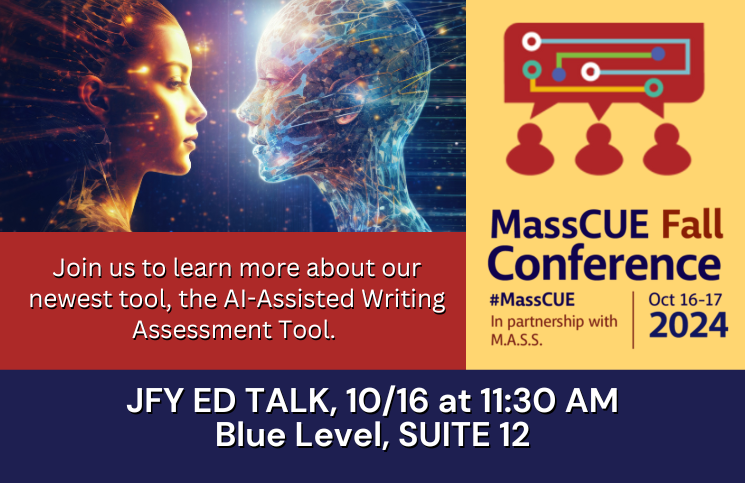by Gary Kaplan
JFY’s New Technologies at MassCUE
Change of Location, Blue Level Suite 12
On October 16 and 17 JFY will exhibit at the MassCUE Fall Conference at Gillette Stadium. This will be our second MassCUE conference this year. The first was the spring conference in Worcester which we announced in a blog post May 23.
We will be giving a presentation on the current range of our technologies, including AI, on Wednesday, October 16, at 11:30 AM in Blue Level Suite 12. This is changed from the previous assigned location in Suite 11. We will have an exhibition table for demonstration and conversation both days, Wednesday and Thursday, in the GP Atrium on the north end of the stadium.
As practitioners of blended learning — the fusion of online and teacher-delivered instruction–we are disciples of Clayton Christensen, the guru of disruptive innovation. It’s worth pausing to review his definition of the term technology.
Technology, according to Dr. Christensen, is “all the processes by which an organization transforms inputs of labor, capital, materials and information into products and services. A teacher lecturing in front of a class is a technology. Students taking notes are a technology. Computers are a technology.” A sentence is a technology that converts immaterial thought into tangible transmissible and archivable data.
Our JFYNet technologies consist of human-supported applications of online tools that directly aid teachers and students in accomplishing necessary tasks. For students, we provide customized software and instructional support that helps them master the language and math skills they need to meet state standards and lay the groundwork for college and careers. For teachers we develop applications that help them customize instruction and manage the flow of assignment, assessment and response in order to give students timely guidance. All our innovations have been developed in response to actual needs articulated by teachers.
Our newest tool, the AI-assisted Writing Assessment Tool, deploys artificial intelligence to assist teachers in one of the most time-consuming of tasks: grading writing assignments. Writing has emerged as a concern in recent years because of the increasing importance of communication in the digital age. In purely academic terms, essay questions comprise one-third of the points on the English MCAS test. But writing is problematic because it requires practice, and writing assignments produce papers that take inordinate amounts of teacher time to grade.
In her September 24 post, Continuing Revolution in the Classroom, Joan Reissman explained the rationale and the operation of our AI Writing Assessment Tool in the context of our total blended tool box.
Generative AI has now been around long enough for Newton’s Third Law to kick in with the inevitable reaction. Skeptics are placing AI in the suspect lineup of previous tech booms and busts. A recent Goldman Sachs report titled Gen AI: Too Much Spend, Too Little Benefit poses the question whether the frenetic AI boom can inexpensively solve real-world problems; or is it “overbuilding things the world doesn’t have use for.” Is the bubble machine out of control?
Innovation is core to JFY’s identity. But our innovations are not speculative bubbles: they have always been responses to articulated needs. In the early 2000s when we were experimenting with instructional software for job training, the state asked if we could apply that tool to the new problem of low MCAS scores. That experiment led to the suite of blended learning applications we now call JFYNet. In the 2010s community colleges were struggling with developmental courses that caused many students to drop out before earning degrees. We applied our high school-based JFYNet tools to college standards and developed JFY College and Career Readiness, which soon morphed into Early College enhanced student support. Two years ago an exasperated English Department head asked if we could somehow adapt our technology to the grading of student essays so that English teachers could assign more writing exercises. The outcome of that hallway query will be on display at MassCUE.
If you visit our exhibit table in the GP Atrium or attend our presentation on Wednesday, October 16, you will see a range of practical technologies that emerged from the classroom and have proven their usefulness in that laboratory of innovation. We didn’t ask: If we build it will they come? They were already there. We built to their specifications.
We continue to refine our technologies with every conversation in the hallway or on zoom. Teachers are our inspiration and our development partners. It’s a collaboration that has driven our innovation for more than two decades and produced a craftsman’s workshop of precision tools for skillful, innovative teachers.
Click on the button below to learn more about JFY’s NEW TECHNOLOGIES at MassCUE’s Fall Conference.
Gary Kaplan is the executive director of JFYNetWorks
Other posts authored by Gary can be found here.
HOW ARE WE DOING? In our pursuit to serve up content that matters to you, we ask that you take a couple of minutes to let us know how we’re doing? Please click here to be navigated to our JFYNet Satisfaction Survey. Thank you!











